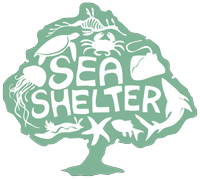Preserving Our Local Marine Life
Marine rescue, rehabilitation and release is very few and far between, with a small splattering of dedicated establishments up the east coast. Sea Shelter aims to bridge the gap in the Hunter specifically for fish & invertebrates.
With help from the local community to report rescues, our dedicated team of volunteers are always ready to head out on a call and help marine life in need. Often when fish are spotted, they are on their last legs. Sea Shelter aims to combat this by scouring the hot spots with our wooden Yacht, inspecting crab traps for Sea Turtles, Shark nets for sea life that are still alive and generally being dependable eyes in the local ocean.
Once the condition of the animal is assessed, the next steps are carried out.
If the animal has passed away, it is brought back to our facility at Irukandji Shark and Ray Encounters for a necropsy performed by our resident Marine Biologist and co-founder, Ryan Pierea. The necropsy data is recorded, and this helps us to understand why the animal passed away.
If the animal is still alive, our volunteers go into life-saving mode. It is carefully rushed back to our facility where it is further assessed and placed into its own quarantine pool for rehabilitation. Depending on the condition of the animal, it may need treatment for wounds, specialised painkillers or antibiotics, or it may need an x-ray and to be assessed by a marine vet that will be called in.
Every animal Sea Shelter rescues comes in in a different condition, so we are always prepared to do what’s needed to save their life.
Through the rehabilitation stage our volunteers help prepare their food, customised to suit that particular animal, feed the animal, clean their pools, and record any food intake, activity and behaviour every day. The rehabilitation may take months, it all depends on the condition of the animal and how quickly they are able to recover.
Once an animal has been steadily showing signs of normal behaviour, eating habits, and has again been assessed, it is ready for release! We always try to release the animal in the same spot that it was found, and a day is chosen, based on weather, tides, winds, and anything that can make it easier for the animal to get back into the wild. A team of volunteers will head out with the animal, spend some time acclimating the animal back into its home, then with a big goodbye it’s released back into its home!
Rescue Hotline
If you have found a sick or injured marine fish (shark or ray) or marine reptile (turtle or sea snake) in and around the Port Stephens area NSW, please call us on 02 4982 2476.
Hospital Update
DECEMBER 2020 UPDATE
Currently in our care is Beryl the Green sea turtle. She was found washed up on a beach at Lemon Tree passage on 13th September 2020. Beryl looked like she was already dead as she had obviously not eaten in a while, was extremely lethargic and covered in parasites. She was weighed at 67kg, estimated over 40 years old and was soon discovered that she was floating. An X-ray revealed she has a gastric blockage which was the cause of the floating and a bone infection. A few months on Beryl is doing great! Unfortunately, she is still floating, but she has a healthy appetite and most of the parasites have been removed! She is active and swimming around getting stronger every day! We are expecting to release her in a month, but if she isn’t ready, there will be further assessment into her condition.
Successful Releases
“We need to respect the oceans and take care of them as if our lives depended on it. Because they do.”




